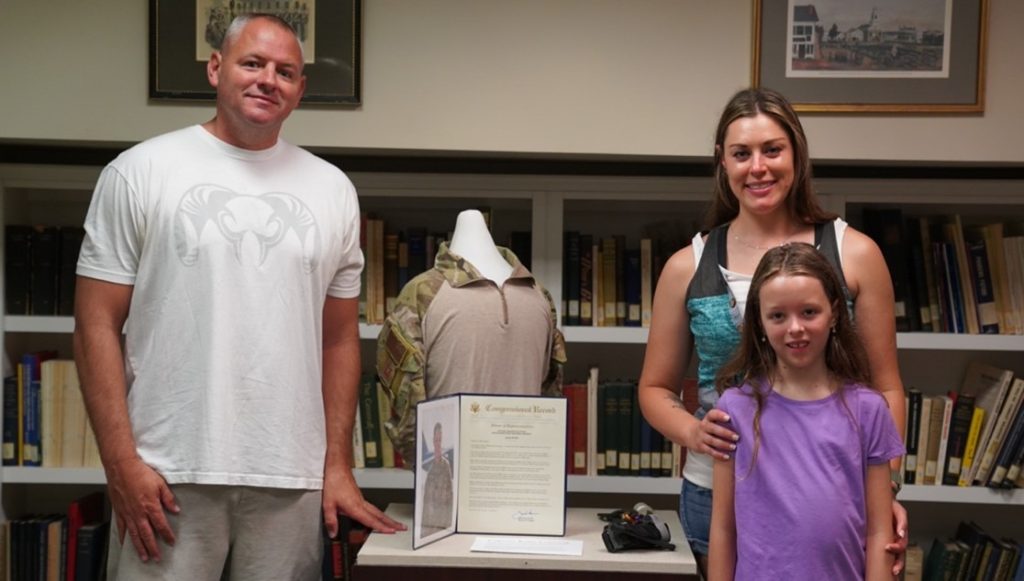By Samantha Burnett
The minuteman has long served as a symbol of the leadership and sacrifice of the National Guard. Today, Air Force Major Katie Lunning acts as a modern-day example. An intensive care unit manager at the Iowa VA hospital, the then Captain Lunning answered a short-notice deployment to serve with the 379th Aeromedical Evacuation Squadron at Al Udeid Air Base, Qatar, in 2021. It was here that Lunning’s remarkable dedication and courage earned her the Distinguished Flying Cross.
Captain Katie Lunning of the Minnesota Air National Guard.
(Photo courtesy of NGEF)
Born to an Army veteran, Lunning’s own entrance into military service began in 2002 when she joined the National Guard in the hope of furthering her education and contributing to her local community. Eventually, Lunning, like many individuals in her family, continued to pursue her passion for nursing. In 2012, Lunning received her bachelor’s degree from Bethel University. Such commitment led to Lunning’s commission as an officer in 2013, marking a significant milestone in her military journey.
Significantly, Lunning’s experiences as a nurse in the National Guard and VA-run hospitals played a critical role in preparing her for the life-altering emergency she would face almost a decade later.
While deployed, Lunning’s primary duties involved providing critical care to wounded soldiers and civilians, as well as medical evacuations from Afghanistan. In reflecting on the nature of this care, Lunning explained that “Kabul was chaotic and unprecedented.” “When Afghanistan fell to the Taliban and the country descended on Kabul to try and escape, we were tasked with flying out the most critically injured. We flew almost non-stop for three weeks.” Lunning recalled, “We had a lot of people who had flash bangs to the face, some gunshot wounds.” “We had a little girl who had some sort of disability that required her to have a [tracheotomy tube] long term… and quite a few pregnant people that were able to give birth,” she recalled.
Captain Katie Lunning, critical care air transport team registered nurse, hard at work.
(Courtesy of Major Katie Lunning)
Yet, it was one particular mission on August 26, 2021, that would act as a defining moment in Lunning’s military career. Amidst the chaotic withdrawal of U.S. forces from Afghanistan, a suicide bombing rocked the Hamid Karzai International Airport in Kabul, resulting in the deaths of 13 Americans and over 150 Afghans, while wounding hundreds more.
Lunning, having just completed a twenty-hour mission, was called to duty on the first responding flight. From here, as an active member of the Critical Care Air Transport Team (CCATT), she was tasked with the challenging mission of transporting twenty-seven critically injured Afghan civilians and U.S. service members to the Landstuhl Region Medical Center in Germany. “We had no idea who we were going to be picking up, what the patients were going to be like, how many patients, we had no clue. It was really flying blind,” Lunning said.
The situation was dire as Lunning’s team navigated unprecedented pandemonium with victims ranging in age from adults to an eighteen-month-old child. While many survivors bore an array of trauma wounds from the bombing, others had gunshot wounds from the intense fighting that had broken out in the area. Lunning’s expertise as a CCATT nurse proved invaluable as she provided immediate medical attention to patients in need of specialized care.
Such efforts were especially commendable given the exhaustion Lunning and her team experienced after continuous operations. “We’re all fighting being awake for like 40 hours,” she said. “We would hit walls from time to time. You try to help each other out, like, ‘Hey, I’ll take the vitals, you sit down for a minute or take a lap around the airplane.”
U.S. Air Force Captain Katie Lunning checks equipment on a C-17 Globemaster III in Kabul, Afghanistan. (Courtesy of Major Katie Lunning)
Despite this fatigue and lack of sufficient medical equipment and staff, Lunning and her team managed to evacuate six critically injured and sixteen injured patients to Landstuhl in an eight-hour flight. All arrived alive. The dedication, coordination, and unwavering determination of Lunning and her team proved critical in ensuring the safe transfer of patients to higher levels of care.
Captain Katie Lunning and other Air Force medical personnel pose for a photo.
(Courtesy of Major Katie Lunning)
Reflecting on her experience, Lunning acknowledged the gravity of the danger both she and her team faced. However, it was in witnessing the resilience of survivors and the impact of her actions that the significance of her role that day was illuminated: “They’re not just living. A lot of them are thriving,” she said. “Everything we did was worth it.”
U.S. Air Force Lieutenant General Michael A. Loh, Director of the Air National Guard, awards Major Katie Lunning with the Distinguished Flying Cross in St. Paul, Minnesota on January 7, 2023.
(U.S. Air Force photo by Tech. Sgt. Amy Loygren)
For her exceptional contributions, Captain Katie Lunning became the first flight nurse in the Air National Guard to be awarded the Distinguished Flying Cross on January 7, 2023, one of the highest military honors for courage in aviation. Lunning’s heroic efforts during a critical moment in history solidified her legacy as an exemplary national guardsman who selflessly rose to the challenge, ultimately making a difference in the lives of countless individuals.
Major Lunning, her husband, and her daughter visited the National Guard Memorial Museum in July when her uniform was temporarily on display in the library. (Photo courtesy of NGEF)
Major Lunning donated the uniform she wore during missions to Afghanistan to the National Guard Memorial Museum. It will soon be on permanent display as a symbol of the National Guard’s important role during the American presence in Afghanistan.







